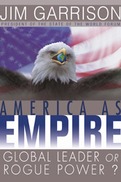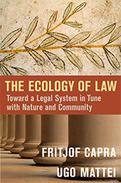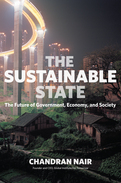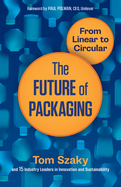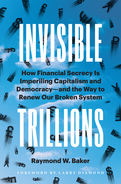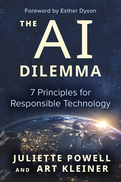Search Results: "Unequal protection"
Results 25-30 of 53
America As Empire
2004
In America as Empire, Jim Garrison urges us to face up to the complexities and responsibilities inherent in the indisputable fact that America is now the world's single preeminent power. "America", Garrison writes, "has become what it was founded not to be: established as a haven for those fleeing the abuse of power, it has attained and now wields near absolute power. It has become an empire."
Garrison traces the roots of the American empire to the very beginnings of the republic, in particular to the historic willingness of United States' to use military might in the defense of two consistent --- if sometimes contradictory --- foreign policy objectives: protection of American commercial interests and promotion of democracy.
How long can the American empire last? Garrison looks at American history within the context of the rise and fall of empires and argues that the U. S. can gain important insights into durability from the Romans. He details the interplay between military power, political institutions, and legal structures that enabled the Roman empire at it's apogee to last for longer than America has as a country.
But the real question is, what kind of empire can and should America be? As the sole superpower, America must lead in shaping a new global order, just as after World War II Roosevelt and Truman took the lead in shaping a new international order. That international order is now crumbling under the pressures of globalization, persistent poverty, terrorism and fundamentalism. Garrison outlines the kinds of cooperative global structures America must promote if its empire is to leave a lasting legacy of greatness. Garrison calls for Americans to consciously see themselves as a transitional empire, one whose task is not to dominate but to catalyze the next generation of global governance mechanisms that would make obsolete the need for empire. If this is done, America could be the final empire.
-
Asserts that America has already made the transition from republic to empire
-
Asks what kind of empire America can and should be, suggesting that America should consciously see itself as a new kind of empire, one that will work to make the notion of empire obsolete
-
Written by the President of the State of the World Forum, a global network whose members include such distinguished figures as Mikhail Gorbachev, Oscar Arias, George Schultz, Jane Goodall, and Elie Weisel
The Ecology of Law
2015
WINNER OF THE 2015 IBPA BENJAMIN FRANKLIN AWARD IN POLITICS/CURRENT EVENTS
The Ecology of Law
Fritjof Capra and Ugo Mattei argue that at the root of many of the environmental, economic, and social crises we face today is a legal system based on an obsolete worldview. Capra, a bestselling author, physicist, and systems theorist, and Mattei, a distinguished legal scholar, explain how, by incorporating concepts from modern science, the law can become an integral part of bringing about a better world, rather than facilitating its destruction.
This is the first book to trace the fascinating parallel history of law and science from antiquity to modern times, showing how the two disciplines have always influenced each other—until recently. In the past few decades, science has shifted from seeing the natural world as a kind of cosmic machine best understood by analyzing each cog and sprocket to a systems perspective that views the world as a vast network of fluid communities and studies their dynamic interactions. The concept of ecology exemplifies this approach. But law is stuck in the old mechanistic paradigm: the world is simply a collection of discrete parts, and ownership of these parts is an individual right, protected by the state. Capra and Mattei show that this has led to overconsumption, pollution, and a general disregard on the part of the powerful for the common good.
Capra and Mattei outline the basic concepts and structures of a legal order consistent with the ecological principles that sustain life on this planet. This is a profound and visionary reconceptualization of the very foundations of the Western legal system, a kind of Copernican revolution in the law, with profound implications for the future of our planet.
The Ecology of Law
Fritjof Capra and Ugo Mattei argue that at the root of many of the environmental, economic, and social crises we face today is a legal system based on an obsolete worldview. Capra, a bestselling author, physicist, and systems theorist, and Mattei, a distinguished legal scholar, explain how, by incorporating concepts from modern science, the law can become an integral part of bringing about a better world, rather than facilitating its destruction.
This is the first book to trace the fascinating parallel history of law and science from antiquity to modern times, showing how the two disciplines have always influenced each other—until recently. In the past few decades, science has shifted from seeing the natural world as a kind of cosmic machine best understood by analyzing each cog and sprocket to a systems perspective that views the world as a vast network of fluid communities and studies their dynamic interactions. The concept of ecology exemplifies this approach. But law is stuck in the old mechanistic paradigm: the world is simply a collection of discrete parts, and ownership of these parts is an individual right, protected by the state. Capra and Mattei show that this has led to overconsumption, pollution, and a general disregard on the part of the powerful for the common good.
Capra and Mattei outline the basic concepts and structures of a legal order consistent with the ecological principles that sustain life on this planet. This is a profound and visionary reconceptualization of the very foundations of the Western legal system, a kind of Copernican revolution in the law, with profound implications for the future of our planet.
The free-market, limited government development model has been an ecological and social disaster for the developing world. Sustainable and equitable development is only possible with the active involvement of a strong central state that can guide the economy, protect the environment, and prioritize meeting their people's basic needs.
In this sure to be controversial book, Chandran Nair shows that the market-dominated model followed by the industrialized west is simply not scalable. The United States alone, with less than five percent of the world's population, consumes nearly a quarter of its resources. If countries in Asia, where 60% of the world's population lives, try to follow the Western lead, the results will be calamitous. .
Instead, Nair argues that development must be directed by a state that is willing and able to intervene in the economy . Corporations, which by design demand ever-expanding consumption, need to be directed towards meeting societal needs or otherwise restrained, not unleashed. Development has to be oriented towards the greatest good—clean drinking water for the many has to take precedence over swimming pools for the few. He provides three compelling case studies demonstrating the benefits of such strong state governance and the findings of weak state governance.
This will mean rethinking the meaning of concepts like “prosperity,” “freedom,” and “rights,” and whether democracy is always the best way to ensure responsive government—as Nair writes, “A democracy that cannot work to improve the life of its citizens is not better than a non-democracy that can actually improve quality of life.” Many people will find these to be challenging ideas, but what Nair offers is a model suited to the realities of the developing world, not the assumptions of the dominant culture.
In this sure to be controversial book, Chandran Nair shows that the market-dominated model followed by the industrialized west is simply not scalable. The United States alone, with less than five percent of the world's population, consumes nearly a quarter of its resources. If countries in Asia, where 60% of the world's population lives, try to follow the Western lead, the results will be calamitous. .
Instead, Nair argues that development must be directed by a state that is willing and able to intervene in the economy . Corporations, which by design demand ever-expanding consumption, need to be directed towards meeting societal needs or otherwise restrained, not unleashed. Development has to be oriented towards the greatest good—clean drinking water for the many has to take precedence over swimming pools for the few. He provides three compelling case studies demonstrating the benefits of such strong state governance and the findings of weak state governance.
This will mean rethinking the meaning of concepts like “prosperity,” “freedom,” and “rights,” and whether democracy is always the best way to ensure responsive government—as Nair writes, “A democracy that cannot work to improve the life of its citizens is not better than a non-democracy that can actually improve quality of life.” Many people will find these to be challenging ideas, but what Nair offers is a model suited to the realities of the developing world, not the assumptions of the dominant culture.
Outstanding Book of the Year gold medalist and “Most Likely to Save the Planet” from the Independent Book Publisher Awards.
Tom Szaky sets out to do the impossible – eliminate all waste. This book paints a future of a “circular economy” that relies on responsible reuse and recycling to propel the world towards eradicating overconsumption and waste.
Only 35 percent of the 240 million metric tons of waste generated in the United States alone gets recycled, according to the Environmental Protection Agency. This extraordinary collection shows how manufacturers can move from a one-way take-make-waste economy that is burying the world in waste to a circular, make-use-recycle economy.
Steered by Tom Szaky, recycling pioneer, eco-capitalist, and founder and CEO of TerraCycle, each chapter is coauthored by an expert in his or her field. From the distinct perspectives of government leaders, consumer packaged goods companies, waste management firms, and more, the book explores current issues of production and consumption, practical steps for improving packaging and reducing waste today, and big ideas and concepts that can be carried forward.
Intended to help every business from a small start-up to a large established consumer product company, this book serves as a source of knowledge and inspiration. The message from these pioneers is not to scale back but to innovate upward. They offer nothing less than a guide to designing ourselves out of waste and into abundance.
Tom Szaky sets out to do the impossible – eliminate all waste. This book paints a future of a “circular economy” that relies on responsible reuse and recycling to propel the world towards eradicating overconsumption and waste.
Only 35 percent of the 240 million metric tons of waste generated in the United States alone gets recycled, according to the Environmental Protection Agency. This extraordinary collection shows how manufacturers can move from a one-way take-make-waste economy that is burying the world in waste to a circular, make-use-recycle economy.
Steered by Tom Szaky, recycling pioneer, eco-capitalist, and founder and CEO of TerraCycle, each chapter is coauthored by an expert in his or her field. From the distinct perspectives of government leaders, consumer packaged goods companies, waste management firms, and more, the book explores current issues of production and consumption, practical steps for improving packaging and reducing waste today, and big ideas and concepts that can be carried forward.
Intended to help every business from a small start-up to a large established consumer product company, this book serves as a source of knowledge and inspiration. The message from these pioneers is not to scale back but to innovate upward. They offer nothing less than a guide to designing ourselves out of waste and into abundance.
Invisible Trillions
2022
Essential reading for anyone truly interested in saving democracy from the predations of kleptocracy and plutocracy.
-Charles Davidson, The Journal of Democracy
This book expands our understanding of the financial secrecy system dominating capitalism today and shows how we can create accountability to restore our democracy.
Over the last half century, capitalism has created the means for trillions of dollars, euros, pounds, and other stores of wealth to move invisibly-beyond the control of central bankers, law enforcement agents, and international institutions. With an entire financial secrecy system now dominating capitalist operations, riches flow inexorably upward and accelerate economic inequality. And rising inequality is directly imperiling-weakening, obstructing, and degrading-democracy.
This book is not a screed against capitalism-it is a call for capitalism to return to its roots, reenergizing its synergies with democracy. Raymond Baker writes, Democratic capitalism is, in my judgment, the best system yet devised in political economy, but dysfunctions within its capitalist component are undermining the two-part system.
Baker explains the tax havens, secrecy jurisdictions, disguised corporations, anonymous trusts, fake foundations, regulatory loopholes, money laundering techniques, and more that make up the financial secrecy system. But he goes beyond the what to the why, examining the motivations driving the system that generates and shelters trillions of dollars that could go toward spreading wealth, generating public goods, and protecting the environment.
Going deeper, Baker illustrates how these realities further corrode the commonwealth, with chapters devoted to the facilitating activities and impacts of banks, corporations, enabling lawyers and accountants, governments, and international institutions and concluding with the limiting role played in policy silos that are missing the bigger picture.
Finally, he provides specific, pragmatic measures to reset capitalism so that it once again contributes to shared prosperity and sustained democracy. This is a magisterial treatment of an issue that is at the root of so many problems that plague our nation and the world today.
-Charles Davidson, The Journal of Democracy
This book expands our understanding of the financial secrecy system dominating capitalism today and shows how we can create accountability to restore our democracy.
Over the last half century, capitalism has created the means for trillions of dollars, euros, pounds, and other stores of wealth to move invisibly-beyond the control of central bankers, law enforcement agents, and international institutions. With an entire financial secrecy system now dominating capitalist operations, riches flow inexorably upward and accelerate economic inequality. And rising inequality is directly imperiling-weakening, obstructing, and degrading-democracy.
This book is not a screed against capitalism-it is a call for capitalism to return to its roots, reenergizing its synergies with democracy. Raymond Baker writes, Democratic capitalism is, in my judgment, the best system yet devised in political economy, but dysfunctions within its capitalist component are undermining the two-part system.
Baker explains the tax havens, secrecy jurisdictions, disguised corporations, anonymous trusts, fake foundations, regulatory loopholes, money laundering techniques, and more that make up the financial secrecy system. But he goes beyond the what to the why, examining the motivations driving the system that generates and shelters trillions of dollars that could go toward spreading wealth, generating public goods, and protecting the environment.
Going deeper, Baker illustrates how these realities further corrode the commonwealth, with chapters devoted to the facilitating activities and impacts of banks, corporations, enabling lawyers and accountants, governments, and international institutions and concluding with the limiting role played in policy silos that are missing the bigger picture.
Finally, he provides specific, pragmatic measures to reset capitalism so that it once again contributes to shared prosperity and sustained democracy. This is a magisterial treatment of an issue that is at the root of so many problems that plague our nation and the world today.
The AI Dilemma
2023
The misuse of AI has led to wrongful arrests, denial of medical care, even genocide-this book offers 7 powerful principles that business can use now to end the harm.
AI holds incredible promise to improve virtually every aspect of our lives, but we can't ignore its risks, mishaps and misuses. Juliette Powell and Art Kleiner offer seven principles for ensuring that machine learning supports human flourishing. They draw on Powell's research at Columbia University and use a wealth of real-world examples.
Four principles relate to AI systems themselves. Human risk must be rigorously determined and consciously included in any design process. AI systems must be understandable and transparent to any observer, not just the engineers working on them. People must be allowed to protect and manage their personal data. The biases embedded in AI must be confronted and reduced.
The final three principles pertain to the organizations that create AI systems. There must be procedures in place to hold them accountable for negative consequences. Organizations need to be loosely structured so that problems in one area can be isolated and resolved before they spread and sabotage the whole system. Finally, there must be psychological safety and creative friction, so that anyone involved in software development can bring problems to light without fear of reprisal.
Powell and Kleiner explore how to implement each principle, citing current best practices, promising new developments, and sobering cautionary tales. Incorporating the perspectives of engineers, businesspeople, government officials, and social activists, this book will help us realize the unprecedented benefits and opportunities AI systems can provide.
AI holds incredible promise to improve virtually every aspect of our lives, but we can't ignore its risks, mishaps and misuses. Juliette Powell and Art Kleiner offer seven principles for ensuring that machine learning supports human flourishing. They draw on Powell's research at Columbia University and use a wealth of real-world examples.
Four principles relate to AI systems themselves. Human risk must be rigorously determined and consciously included in any design process. AI systems must be understandable and transparent to any observer, not just the engineers working on them. People must be allowed to protect and manage their personal data. The biases embedded in AI must be confronted and reduced.
The final three principles pertain to the organizations that create AI systems. There must be procedures in place to hold them accountable for negative consequences. Organizations need to be loosely structured so that problems in one area can be isolated and resolved before they spread and sabotage the whole system. Finally, there must be psychological safety and creative friction, so that anyone involved in software development can bring problems to light without fear of reprisal.
Powell and Kleiner explore how to implement each principle, citing current best practices, promising new developments, and sobering cautionary tales. Incorporating the perspectives of engineers, businesspeople, government officials, and social activists, this book will help us realize the unprecedented benefits and opportunities AI systems can provide.


